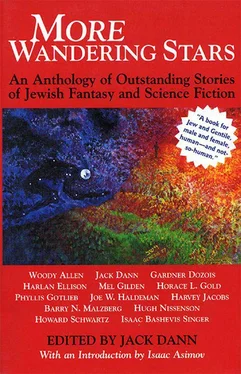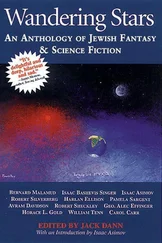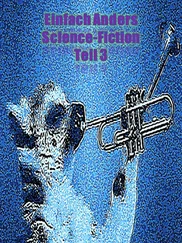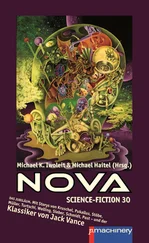“We will do whatever you advise, Golem.”
Og continued with his work, but while he was digging he turned up a strange artifact and he had a foreboding. At times he had discovered potsherds which were the remnants of clay vessels the Cnidori had made to cook vegetables they could not digest raw, and this discovery was an almost whole cylinder of the same texture, color, and markings; one of its end rims was blackened by burn marks, and dark streaks ran up its sides. He did not know what it was but it seemed sinister to him; in conscience he had no choice but to show it to Zohar.
“It does not seem like a cooking vessel,” he said.
“No,” said Begelman. “It does not.” He pointed to a place inside where there was a leaf-shaped Cnidori scale, blackened, clinging to its wall, and to two other burn marks of the same shape. Strangely, to Og, his eyes filled with tears.
“Perhaps it is a casing in which they dispose of their dead,” Og said.
Zohar wiped his eyes and said, “No. It is a casing in which they make them dead. Many were killed by Unds, and some have starved and the rest die of age. All those they weight and sink into the marshes. This is a sacrifice. They have a god, and its name is Baal.” He shook his head. “My children.” He wept for a moment again and said, “Take this away and smash it until there is not a piece to recognize.”
Og did so, but Zohar locked himself into his room and would not answer to anyone.
Og did not know what to do now. He was again as helpless as he had been on the loading dock where he had first learned to use his logic.
The Cnidori came to inquire of Golem and he told them what had happened. They said, “It is true that our ancestors worshipped a Being and made sacrifices, but none of that was done after Zohar gave us help. We were afraid he and his God would hold us in contempt.”
“Both Zohar and his God have done imperfect acts. But now I will leave him alone, because he is very troubled.”
“But it is a great sin in his eyes,” said Binyamin sorrowfully. “I doubt that he will ever care for us again.”
And Og continued with his work, but he thought his logic had failed him, in accordance with Zohar’s taunts.
In the evening a Cnidor called Elyahu came writhing toward him along the ground in great distress. “Come quickly!” he called. “Binyamin is doing nidset! ”
“What is that?”
“Only come quickly!” Elyahu turned back in haste. Og unclipped his scoops and followed, overtaking the small creature and bearing him forward in his arms. They found Binyamin and other Cnidori in a grove of ferns. They had built a smoky fire and were placing upon it a fresh cylinder: a network of withy branches had been woven into the bottom of it.
“No, no!” cried Og, but they did not regard him; the cylinder was set on the fire and smoke came out of its top. Then the Cnidori helped Binyamin climb over its edge and he dropped inward, into the smoke.
“No!” Og cried again, and he toppled the vessel from the fire, but without violence so that Binyamin would not be harmed. “You shall make no sacrifices!” Then he tapped it so that it split, and the Cnidor lay in its halves, trembling.
“That is nidset , Golem,” said Elyahu.
But Golem plucked up the whimpering Cnidor. “Why were you doing such a terrible thing, Binyamin?”
“We thought,” Binyamin said in a quavering voice, “we thought that all of the gods were angry with us—our old god for leaving him and our new one for having worshipped the old—and that a sacrifice would take away the anger of all.”
“That confounds my logic somewhat.” Og set down Binyamin, beat out the fire, and cast the pieces of the cylinder far away. “All gods are One, and the One forgives whoever asks. Now come. I believe I hear the Unds again, and we need shelter close to home until we can build a wider one.”
Then the Cnidori raised a babble of voices. “No! What good is such a God if even Zohar does not listen to Him and forgive us?”
It seemed to Og for one moment as if the Cnidori felt themselves cheated of a sacrifice; he put this thought aside. “The man is sick and old, and he is not thinking clearly either, while you have demanded much of him.”
“Then, Golem, we will demand no more, but die among the Unds!” The shrieking of the beasts grew louder on the night winds but the Cnidori drew their little knives and would not stir.
“Truly you are an outrageous people,” said Golem. “But I am only a machine.” He extended his four hinged arms and his four coil arms and bearing them up in their tens raced with them on treads and wheels until they were within the safety of the forcefield.
But when he set them down they grouped together closely near the field and would not say one word.
Og considered the stubborn Zohar on the one side, and the stubborn b’nei Avraham on the other, and he thought that perhaps it was time for him to cease his being. A great storm of lightning and thunder broke out; the Unds did not approach and within the forcefield there was stillness.
He disarmed himself and stood before Zohar’s door. He considered the sacrifice of Yitzhak, and the Golden Calf, and of how Moshe Rabbenu had broken the Tables, and of many excellent examples, and he spoke quietly.
“Zohar, you need not answer, but you must listen. Your people tell me they have made no sacrifices since they knew you. But Binyamin, who longs to call himself your son, has tried to sacrifice himself to placate whatever gods may forgive his people, and would have died if I had not prevented him. After that they were ready to let the Unds kill them. I prevented that also, but they will not speak to me, or to you if you do not forgive them. I cannot do any more here and I have nothing further to say to you. Good-bye.”
He turned from the door without waiting, but heard it open, and Zohar’s voice cried out, “Og, where are you going?”
“To the storeroom, to turn myself off. I have always said I was no more than a machine, and now I have reached the limit of my logic and my usefulness.”
“No, Golem, wait! Don’t take everything from me!” The old man was standing with hands clasped and hair awry. “There must be some end to foolishness,” he whispered. “Where are they?”
“Out by the field near the entrance,” Og said. “You will see them when the lightning flashes.”
The Holy One, blessed be His Name, gave Zohar one more year, and in that time Og ha-Golem built and planted, and in this he was helped by the b’nei Avraham. They made lamps from their vegetable oils and lit them on Sabbaths and the Holy Days calculated by Zohar. In season they mated and their bellies swelled. Zohar tended them when his strength allowed, as in old days, and when Elyahu died of brain hemorrhage and Yitzhak of a swift-growing tumor which nothing could stop, he led the mourners in prayer for their length of days. One baby was stillborn, but ten came from the womb in good health; they were gray-pink, toothless, and squalled fearfully, but Zohar fondled and praised them. “These people were twelve when I found them,” he said to Og. “Now there are forty-six and I have known them for five generations.” He told the Cnidori, “Children of Avraham, Jews have converted, and Jews have adopted, but never children of a different species, so there is no precedent I can find to let any one of you call yourself a child of Zohar, but as a community I see no reason why you cannot call yourselves b’nei Zohar, my children, collectively.”
The people were wise enough by now to accept this decision without argument. They saw that the old man’s time of renewed strength was done and he was becoming frailer every day; they learned to make decisions for themselves. Og too helped him now only when he asked. Zohar seemed content, although sometimes he appeared about to speak and remained silent. The people noticed these moods and spoke to Og of them occasionally, but Og said, “He must tend to his spirit for himself, b’nei Avraham. My work is done.”
Читать дальше












